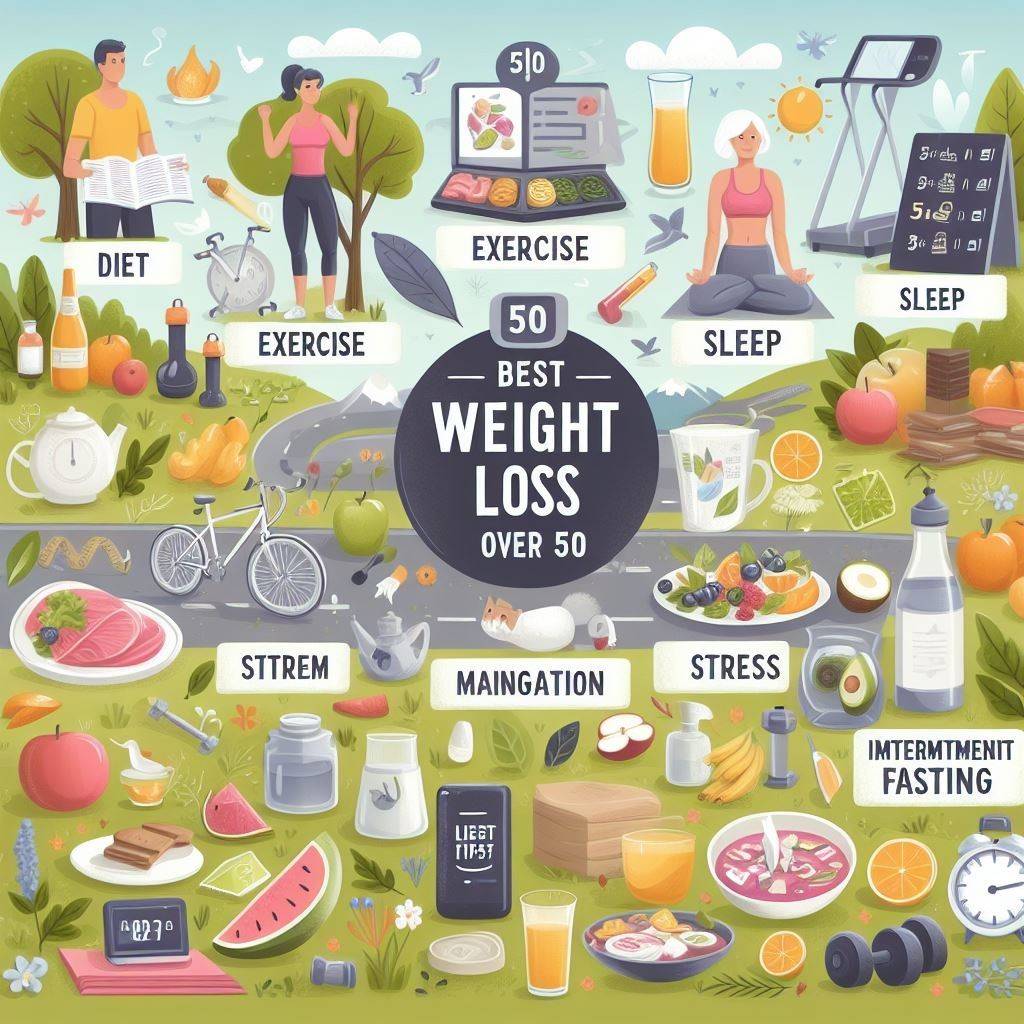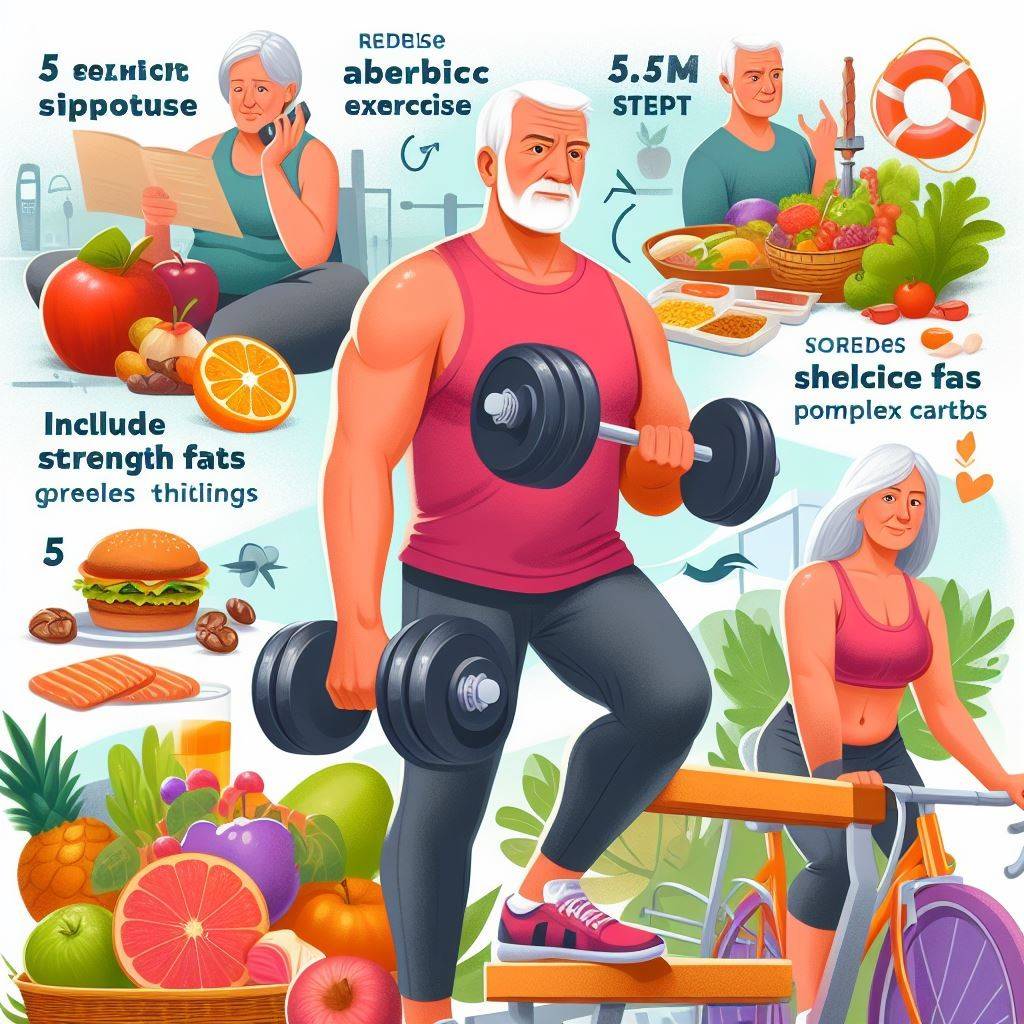Weight loss tips for those over 50 can seem daunting, but with some simple lifestyle changes, those over 50 can safely and effectively lose weight. As we age, our metabolism slows down and we lose muscle mass, making weight loss more challenging. However, doggedly and committed to a healthy routine, weight loss is certainly achievable after 50.
Why Weight Loss Gets Harder After 50
Losing weight can become more challenging as we age for various reasons:
- Metabolism slows. Typically, metabolism decreases by 2-3% every decade after age 30. A slower metabolism burns fewer calories.
- Loss of muscle mass. Starting in our 30s, muscle mass naturally declines if strength training is not done. Less muscle means a lower metabolism.
- Hormonal changes. Drops in estrogen, progesterone, testosterone, and human growth hormone can increase body fat storage.
- Increased insulin resistance. Cells may become less sensitive to insulin, making it harder to manage blood sugar and body weight.
- Stress. High or chronic stress promotes fat storage, especially belly fat. It may also lead to overeating.
- Lifestyle changes. Jobs, family, injuries, or illness can reduce our ability to exercise and eat well. Inactivity and poor eating habits make weight loss tougher.
The Best weight loss tips for over 50

Here are the top weight loss tips for over 50:
Focus on Exercise
Weight loss tips for over 50 should always emphasize exercise. While diet is important for weight loss at any age, exercise becomes particularly key as we get older. Exercise helps counteract the muscle loss that comes with aging. Building muscle mass boosts metabolism, allowing you to burn more calories throughout the day.
Aim for 150 minutes of moderate cardio exercise per week, such as brisk walking, swimming, or cycling. Also, incorporate strength training at least twice a week to maintain and build muscle. Weightlifting, Pilates, and yoga are great strength training options.
Cut Calories Gradually
Drastic calorie cuts can backfire as you age. Severe calorie restriction causes muscle loss as your body breaks down muscle for energy. This slows your metabolism even further. Make small, gradual cuts of about 250-500 calories per day instead. Use a TDEE calculator to determine your maintenance calories, then aim for a modest deficit. Losing 1-2 pounds per week is a healthy goal.
Eat More Protein
Weight loss tips for over 50 emphasize protein. Getting adequate protein preserves lean muscle mass as you lose weight. Aim for 0.5-0.7 grams of protein per pound of body weight. Include a protein source, such as eggs, lean meats, fish, beans, or dairy, at each meal. Protein powders can also help you meet your daily needs.
Limit Refined Carbs and Added Sugars
Limiting refined carbs and added sugars assists weight loss efforts in those over 50. Refined carbs like white bread, crackers, and sugary snacks cause spikes and crashes in blood sugar. Focus on whole food sources of complex carbs like fruits, vegetables, whole grains, beans, and lentils. Avoid processed carbs and sweet treats. Read labels and choose products with minimal added sugars.
Stay Hydrated
Hydration is key for those over 50 losing weight. Thirst signals diminish with age, so make a conscious effort to drink water regularly. Proper hydration keeps your metabolism going and can reduce water retention. Drink at least 64 ounces per day and more if you are active. Herbal tea, water with fruit, and sparkling water provide variety.
Develop a Regular Eating Pattern
Weight loss tips for those over 50 emphasize a regular meal schedule. Avoid erratic meal timing. Having a consistent breakfast, lunch, dinner, and snack times regulates appetite hormones and blood sugar. Ensure to eat a filling breakfast. Skipping breakfast causes overeating later in the day. Time meals 4-5 hours apart. Allow no more than 10-11 hours of fasting overnight.
Get Plenty of Sleep
Adequate sleep is crucial for weight loss after 50. Lack of sleep causes metabolic changes that promote weight gain. Older adults require 7-8 hours per night. Having a consistent bedtime and limiting screen time in the evenings sets you up for better sleep. Consider supplements like melatonin if needed.
Manage Stress
Chronic stress increases cortisol levels, which leads to weight gain concentrated around the midsection. Weight loss tips for over 50 include adopting stress-relief practices like meditation, yoga, deep breathing, and journaling. Set aside time each day to calm your mind. Simplify your schedule and learn to say no to overwhelm.
Choose Whole Foods
A diet rich in whole, unprocessed foods assists weight loss for over 50s. Whole foods like fruits, vegetables, lean proteins, whole grains, and healthy fats provide nutrients vital to health and metabolism. Processed foods have added sugar, unhealthy fats, and chemical additives. Focus your diet on produce, proteins, complex carbs, and healthy fats like nuts, seeds, and olive oil.
Lift Weights First
If you do cardio and weight training on the same day, lift weights first. Weight training early in your workout fires up your metabolism. The post-workout metabolic boost will help you burn more fat during your cardio session. Conversely, doing cardio first can tire you out for optimal strength training. Prioritize weights, then follow up with cardio.
Add in HIIT
Weight loss tips for over 50 recommend incorporating high-intensity interval training (HIIT). HIIT combines short bursts of intense exercise with active rest periods. This type of training revs up your metabolism and keeps burning calories long after your workout ends. Try adding a few 30-60-second high-intensity intervals during your usual cardio routine.
Be Patient and Persistent
Losing weight after 50 requires diligence and consistency. But minor changes to your eating and exercise habits can add up to big results over time. Be patient with yourself and aim to lose 1-2 pounds per week for steady, sustainable weight loss. With a commitment to a healthier lifestyle, you can successfully slim down and improve your health.
Consult Your Doctor
Always talk to your doctor before starting a new diet or exercise routine, especially if you have any underlying health conditions. Your doctor can do any necessary health screening and help set safe weight loss goals. Getting your doctor’s input provides guidance tailored to your individual health needs.
Tips for Safe, Effective Weight Loss After 50

Losing weight after 50 requires some special considerations. Here are tips on how to lose weight safely and effectively in your 50s, 60s, and beyond:
Weight loss tips for over 50:
- Do aerobic exercise regularly to maintain heart health. Focus on low-impact activities like walking, swimming, or cycling.
- Include strength training to preserve muscle mass. Lifting weights is key.
- Reduce portions of healthy fats and complex carbs. Don’t cut them out entirely.
- Choose nutrient-dense foods like vegetables, fruits, whole grains, and lean proteins.
- Stay hydrated and drink water throughout the day.
- Take stairs instead of elevators, when possible, for extra activity.
- Ask your doctor about vitamin D and calcium supplements to protect your bones.
- Get at least 7-8 hours of sleep per night. Lack of sleep influences weight gain.
- Manage stress through relaxing activities such as yoga, meditation, or deep breathing.
- Weigh yourself once per week to track progress. More often can cause anxiety.
- Set realistic goals of losing a maximum of 1-2 pounds per week, for safe results.
- Consult your healthcare provider before making major changes to your diet.
Doggedly and committed to developing healthy new habits, safe weight loss over 50 is achievable. Consistency with both diet and exercise goals is key. Small cumulative changes make the biggest difference over time. Stay patient through the process by focusing on overall wellness.
Sample Meal Plan for Weight Loss Over 50
Here is a sample 1,500-calorie meal plan appropriate for safe, sustainable weight loss for over 50s:
Monday
Breakfast: Oatmeal made with 1⁄2 cup oats, 1 cup almond milk, 1⁄2 cup berries, 1 Tbsp almonds (376 calories)
Lunch: Tuna salad made with 3 oz tuna, 2 Tbsp plain Greek yogurt, mustard, celery, and lettuce on whole wheat toast (343 calories)
Dinner: 3 oz baked salmon, 1 cup roasted Brussels sprouts, 1⁄2 cup wild rice (493 calories)
Snack: 1 apple with 1 Tbsp peanut butter (181 calories)
Tuesday
Breakfast: 2 scrambled eggs, 1 slice whole wheat toast, 1⁄2 cup mixed fruit (323 calories)
Lunch: Turkey wrap with 3 oz turkey, lettuce, tomato, avocado and 1 slice provolone on whole wheat tortilla (402 calories)
Dinner: 3 oz grilled chicken breast, 1 cup roasted sweet potato, 1 cup green beans (431 calories)
Snack: 1⁄4 cup cottage cheese with 1⁄4 cup blueberries (110 calories)
Wednesday
Breakfast: 1 serving high protein cereal with 1 cup of unsweetened almond milk (250 calories)
Lunch: Veggie salad with chickpeas, beets, tomatoes, cucumbers, red onion and 2 Tbsp balsamic vinaigrette (401 calories)
Dinner: Veggie stir fry made with tofu, onions, peppers, broccoli, carrots over 1⁄2 cup brown rice (429 calories)
Snack: 1⁄2 cup plain nonfat Greek yogurt with cinnamon (100 calories)
Thursday
Breakfast: 2 eggs over whole grain toast with 1⁄2 avocado spread (349 calories)
Lunch: Lentil soup made with veggies and 1 whole grain roll (393 calories)
Dinner: 3 oz grilled salmon over salad with lettuce, tomato, cucumber, 1 Tbsp olive oil lemon dressing (357 calories)
Snack: Small apple with 2 Tbsp natural peanut butter (255 calories)
Friday
Breakfast: 1 cup unsweetened Greek yogurt with 1⁄4 cup granola and 1⁄2 cup berries (367 calories)
Lunch: Veggie burger on whole wheat bun with lettuce, tomato, avocado (418 calories)
Dinner: 3 oz grilled pork tenderloin, 1 cup sautéed kale, 1⁄2 cup quinoa (402 calories)
Snack: 1 oz mozzarella cheese stick and 10 whole grain crackers (208 calories)
Conclusion
Weight loss for over 50s demands a whole-body approach. A combination of regular exercise, a nutrient-dense diet, and healthy lifestyle practices enable safe, sustainable weight loss. Have realistic expectations and make gradual changes to your routine. Losing just 1-2 pounds per week adds up over time. Consult your doctor to address any health concerns. With a commitment to developing healthy habits, weight loss over 50 is very achievable.
Frequently Asked Questions about weight loss tips for over 50
How much should I cut calories to lose weight after 50?
A moderate daily deficit of 500-750 calories typically leads to healthy 1-2 pounds of weight loss per week. Track your normal calorie intake, then aim to cut 500-750 calories through diet, exercise, or a combination.
What if I have a slow metabolism?
Focus on building muscle through strength training, getting enough protein, staying active, eating small frequent meals, sleeping well, and managing stress. These habits help counteract a slow metabolism.
Should I follow a low-carb or low-fat diet after 50?
Quality matters more than carbs or fat. Focus on whole, minimally processed foods like veggies, fruits, lean proteins, whole grains, beans, nuts, seeds, and healthy fats from foods like olive oil, avocado, and fatty fish.
How much protein should I eat daily?
Most experts recommend eating 0.5-0.7 grams of protein per pound of body weight, or about 90-120 grams for a 200-pound person. Protein helps preserve muscle and keeps you feeling fuller for longer.
What if I have a joint pain that limits my workouts?
Low-affected activities like walking, swimming, water aerobics, cycling, elliptical machines, yoga, Pilates, and strength exercises with resistance bands can help burn calories without joint pain.

Adel Galal is a health and wellness writer with over 30 years of experience studying and writing about health, fitness, nutrition, and healthy living. He is the founder of NextFitLife.com, where he shares practical, evidence-based guidance to support long-term health at any age. Adel’s mission is simple:
to help people make smarter health choices that fit real life, at any age.



